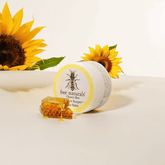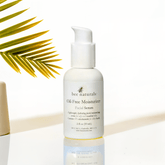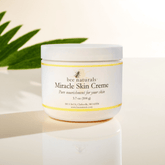The Evolution of Modern Preservatives: What you Need to Know
“Preservative-free”
“Non-toxic”
“Non-GMO”
“Organic”
“Clean”
Do any of these sound familiar? If you’re into natural skincare as much as we are, then you’ve no doubt stumbled across the myriad of brands touting claims like these. These pseudoscientific marketing labels are what has now been coined as “greenwashing,” a form of conveying misleading information to give consumers the impression that a product is somehow better than their less “natural” counterparts, be it in a more environmentally-friendly, healthier, or less toxic way.
In skincare, the preservative-free movement is greenwashing at its finest. Without some form of preservation, however, a skincare product runs the risk of spoiling and becoming a breeding ground for bacteria. At best, a preservative-free skincare product may start to smell rancid, and at worst, can cause a skin infection.
WHAT ARE COSMETIC PRESERVATIVES?
To start, let’s define a preservative. A preservative is an ingredient used to protect cosmetic products from contamination by bacteria, yeast, or mold from the time the product is manufactured up until the time the product is used up by the consumer. Preservatives that protect against all three contaminants are known as broad-spectrum preservatives. For those preservatives that aren’t broad-spectrum, it’s common for formulators to use a few in combination with one another to ensure the formula can defend itself against all types of contamination.

Without the use of preservatives, you run the risk of your product spoiling and becoming ground zero for all kinds of concerns. Imagine leaving the leftovers from dinner sitting on the counter for a couple of days. You wouldn’t eat them, right? Well, the same goes for your skincare products!
The contamination of cosmetic products can result in visible changes such as a nasty odor, color changes, viscosity, texture changes, gas production, and the degradation of active ingredients rendering the product ineffective. Sometimes these changes are also completely indiscernible, so you may not be able to detect contamination/bacterial growth. The most important concern, however, is the possibility of more severe health concerns such as contact dermatitis, or skin/systemic infections.
So, do all skincare products need a preservative? Water-based lotions and creams are the most common types of skincare products that need a preservative. Products like lip balms and water-free ointments, however, are generally considered to be ‘self-preserved’ as they don’t contain all the necessary elements from organisms to grow and multiply.
WHAT PRESERVATIVES ARE FOUND IN BEE NATURALS PRODUCTS?
At Bee Naturals, we have always used a proven preservative blend of phenoxyethanol, caprylyl glycol, and sorbic acid, also known commercially as Optiphen Plus, and by other names, to preserve our products. This blend of preservative ingredients is used in the majority of our water-containing products. This is our blend of choice because of its long history of safe use, as well as its ability to fully defend our products against the most harmful microbes.
Today, we are excited to announce that we will be introducing some new preservatives to our formulation repertoire, a blend of 75% Gluconolactone and 25% Sodium Benzoate, also known as Neodefend, among other brands.
Benefits of gluconolactone and sodium benzoate:

- Improves skin moisture to maintain the skin’s natural protective barrier
- Compatible with most cosmetic ingredients
- Broad-spectrum preservative with an exceptional toxicity profile
- Non-irritating and safe for sensitive skin
- Effective over a pH range of pH 3 – 6
- No animal testing and non-GMO
Benefits of Gluconolactone:
The main ingredient of this preservative blend is Gluconolactone, an ECOCERT approved preservative with a rating of 1 from the Environmental Working Group (EWG), the best rating they can award a preservative. It can be used as a standalone preservative or a supporting ingredient
- Broad-spectrum preservative – protects against bacteria, yeast, and mold
- Chelating – reacts with metal ions in to stabilize a product’s formula and aid in the removal of toxic metals
- Moisture enhancing – works alongside other ingredients to boost moisture content within the skin
- Antioxidant – minimizes free radical damage on the skin and protects against everyday environmental stressors such as pollution and sun damage
We will also start using Phenylpropanol EHG in some of our formulas, another EWG-approved preservative that’s a blend of Phenylpropanol (70%) and Ethylhexylglycerin (30%).
Benefits of Phenylpropanol EHG:
- Broad-spectrum preservative – protects against bacteria, yeast, and mold
- Deodorizing properties – effective against odor-causing bacteria
- Humectant – helps bind moisture to the skin
- Ideal for use in all rinse-off and leave-on formulations
- Stable and effective across a wide pH range of 3 – 12
- Temperature stable up to 100°C
- Excellent compatibility with salts, non-ionic surfactants, and pigments such as titanium dioxide used in cosmetics
Lastly, we will be incorporating Caprylyl Glycol EHG, another EWG-approved preservative.
Benefits of Caprylyl Glycol EHG:
- Humectant – helps bind moisture to the skin
- Antimicrobial
- Boosts the efficacy of other preservatives
- Deodorizing properties – effective against odor-causing bacteria
- Accepted by Whole Foods
Why are we making these changes? It allows us to eliminate, or reduce the use of phenoxyethanol, which can be irritating to some individuals, while still providing robust product preservation, with added skin benefits.

The next time you’re looking at cosmetic products and find yourself being wooed by the promises of “all-natural” and “preservative-free,” remember this:
Preservatives are nothing to be scared of, so long as they’re the right preservatives!
References
https://www.businessnewsdaily.com/10946-greenwashing.html
https://chemistscorner.com/how-to-prevent-contamination-in-cosmetic-products/
https://cosmetictestlabs.com/five_most_common_types_of_preservatives_used_in_cosmetics.html
https://www.bathbybettijo.com/preservatives.php







Leave a comment
Please note, comments need to be approved before they are published.